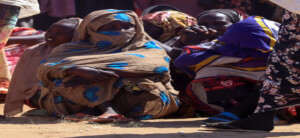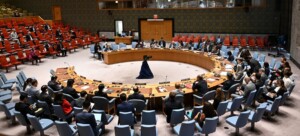Investigator Darfur mass rape: “Ensure it will not happen again”
“We documented a truly tragic incident in Tabit and we are calling on the international community to undertake measures to try to ensure that something like this is not going to be able to happen in that town again”, says Jonathan Loeb researcher of Human Rights Watch (HRW) about the mass rape of 221 women and girls in Tabit (HRW) in an interview with Dabanga on 11 February 2015.
“We documented a truly tragic incident in Tabit and we are calling on the international community to undertake measures to try to ensure that something like this is not going to be able to happen in that town again”, says Jonathan Loeb, researcher of Human Rights Watch (HRW) about the mass rape of 221 women and girls in Tabit (HRW) in an interview with Dabanga on 11 February 2015. A summary of the radio-interview.
RD: So first, how can you describe, what is happening in Tabit, at that day? And how it has happened, according to your report?
JL: Absolutely. So, after reading the report by Radio Dabanga on November 2nd. What we noticed that in the aftermath of that report, the government of Sudan undertook drastic measures to blockade the town of Tabit, and to silence the population. So they prevented other journalists, other human rights investigators, and they prevented UN peacekeepers from conducting credible investigation. Once we realised that no one was going to be able to get on the ground in Tabit to do a credible investigation, HRW decided to undertake a remote investigation.
What these witnesses and other victims told us, they gave us a fairly consistent story. Two of these three attacks occurred at night, on Thursday evening and Friday evening. Most of the time, people were inside their houses, and inside their compounds in Tabit. The soldiers would show up at these houses and they would barge in, completely unexpected, and the residents of the town would be taken aback.
The soldiers would immediately accuse people in these houses of either abducting or killing a missing soldier from the battalion. They would start accusing them and would start searching the house. They also started severely beating the men so that the men were either forced to run away or they would be arrested, detained, by members of the military who would then take them to other locations. Once the men were out of the house, the soldiers then started to rape many of the women inside these houses.
RD: According to your investigations, who ordered the soldiers to do this? Or did it happen without any orders given?
JL: In addition to the victims and the witnesses, we interviewed four defectors who were stationed at the military base outside of Tabit. Three of these defectors reported to us that they participated in one of these attacks. Two of the defectors told us that they were given orders to rape. One said that he was given orders to guard the road into the town, and two said that they were specifically given orders to rape women. One said that his orders came from a commander who was stationed in the base in Tabit, and another said that his orders came from a different commander who had arrived with some other soldiers from El Fasher. We don't know precisely how high up the chain of command these orders went, but what we do know is that these soldiers who participated in this attack, said that they were given direct orders to rape women and that these orders came from superior commanders, either stationed on the base, or stationed in El Fasher.
RD: Did this event have anything to do with the alleged kidnapping of a soldier, allegedly related to a woman in the town?
JL: The victims that we interviewed said that they were accused of abducting a soldier. Most of the victims we interviewed said they did not know that a soldier was abducted and that they did not understand why there were being accused of this. The soldier who we spoke to though, said yes, that there was another soldier of whom they did not know where he was. But, they said that this was just a pretext to enter the town. What one of these soldiers reported to us is that they received some intelligent information that a rebel commander was going to come back to the area an attack the base in Tabit. This defector told us that he believes that [the military] were attacking the town and punishing the population because they believed that this population was supporting the rebels in some manner. That said, through our investigation, we did not find any evidence that there were any rebels in Tabit, or that there were any rebel ammunitions in the town at that time. While we still do not precisely know the reason [for the attack], these are the explanations that we got from the soldiers and from the victims.
RD: How many children were raped according to these investigations?
JL: We don't have the ages of everyone, of all the 221 [raped women], but we did receive reports of many women being under the age of 18. I spoke, unfortunately, to two mothers, both of whom had three of their daughters raped. And in both cases, two of the daughters were very very young, two being under the age of 10. So we don't know the precise numbers but we do know that tragically, many young girls were also raped during these attacks.
RD: How is it possible that Unamid first could not enter Tabit, and denied that it entered Tabit, while the investigators of the committees you worked with were able to enter? What does your report say about Unamid?
JL: There is a chapter in the report on the response by the international community in general and by the Unamid specifically. Perhaps, most importantly, we spoke to residents of the town, who told us that they were threatened by government officials and told that they were not permitted to talk to Unamid. They told us that certain individials in the town were selected beforehand and authorised to speak to Unamid. And if you were not selected, you were not allowed to talk. But if you did talk, there would be serious consequences.The take-away point is that Unamid was not able to conduct a real investigation, and Unamid made a big mistake by reporting the next day that they had been able to do so.
RD: What would you reply to the government of Sudan in case it is calling your report a conspiracy against Sudan, and saying that you were not there on the ground to investigate?
JL: The government has denied that any mass rape or any incidents of rape took place in Tabit. It is possible that they are going to continue to say that, after our report is published. Our response is that we would welcome them to open up Tabit to independent investigators to conduct a credible investigation and until that is done, merely denying that an incident took place, is in our view a credible response.
RD: What are your recommendations for the international community and people in Darfur, after the conclusions of this report into the mass rape in Tabit?
JL: The important thing to know is that some of the people in Tabit have fled the town but many of them are still living there. They are still very vulnerable and there still is a constant government and military presence in the town. We call on Unamid to establish a permanent base inside the town. Without a permanent presence inside the town, we do not think that the Unamid is able to fulfill its mandate of protecting civilians inside of Tabit. We documented a truly tragic incident in Tabit and we are calling on the international community to undertake measures to try to ensure that something like this is not going to be able to happen in that town again. And to undertake measures to try to ensure that it will not happen in other towns. Hopefully they are going to do that.











 and then
and then